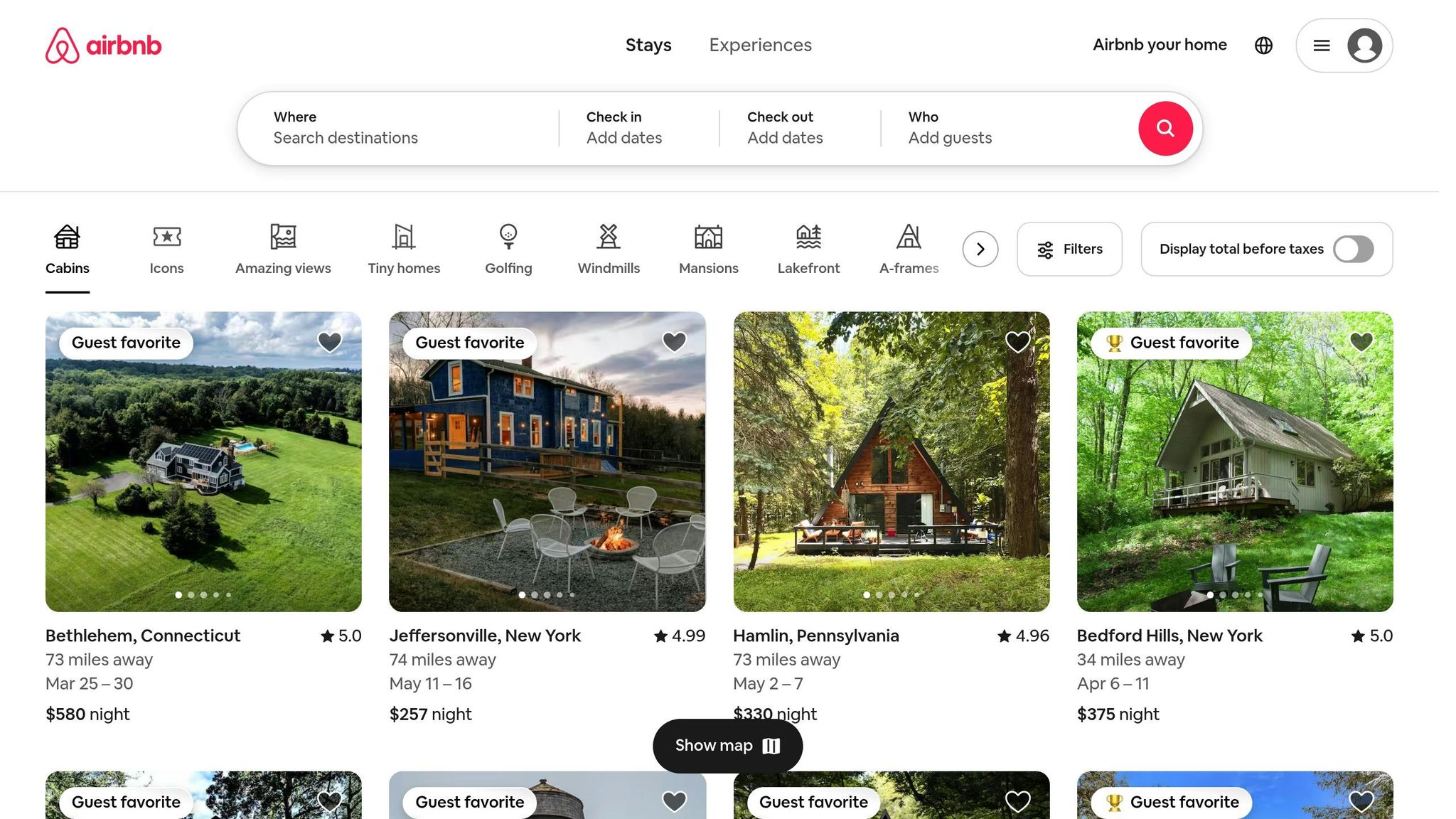
- Harsh Maur
- March 21, 2025
- 7 Mins read
- WebScraping
How Tourism Agencies Can Benefit from Airbnb Data Scraping
Airbnb data scraping can transform how tourism agencies operate. By collecting and analyzing data from millions of Airbnb listings, agencies can uncover key insights to refine their strategies, improve pricing, and better serve travelers. Here's what you can gain:
- Understand Market Trends: Track pricing, demand patterns, and seasonal shifts.
- Identify Hot Destinations: Discover emerging travel hotspots and guest preferences.
- Improve Customer Offerings: Tailor travel packages based on amenities, reviews, and booking behavior.
- Stay Competitive: Monitor competitor strategies and adjust pricing in real time.
- Plan for Events: Analyze booking trends tied to local events or seasonal surges.
Quick Tip: Use services like Web Scraping HQ to automate data collection while ensuring compliance with legal guidelines. Focus on metrics like occupancy rates, average daily rates, and guest reviews to make smarter business decisions.
Airbnb data scraping isn’t just a tool - it’s a game-changer for agencies aiming to stay ahead in the competitive tourism market.
Why Airbnb Data Matters for Tourism Agencies

Airbnb Data Scraping
Airbnb data provides important insights that help tourism agencies shape effective business strategies. By analyzing this data, agencies can better understand and respond to changing traveler preferences.
Key Airbnb Data Metrics to Watch
Tourism agencies should pay close attention to several important metrics when working with Airbnb data:
- Occupancy Rates: Track real-time trends to fine-tune pricing and pinpoint peak booking times.
- Average Daily Rate (ADR): Analyze pricing shifts across locations and seasons.
- Property Details: Explore features like amenities, layouts, and standout characteristics.
- Guest Reviews: Gather qualitative insights into guest experiences and preferences.
- Location Data: Examine which areas are popular and spot up-and-coming neighborhoods.
These metrics go beyond individual property performance, offering a broader market perspective that's essential for planning and strategy.
What Airbnb Data Reveals About Market Trends
Data from Airbnb reveals patterns that have a direct impact on travel tactics. For example, listing page views in Paris and neighboring cities like Lille, Versailles, and Lyon increased 11 times over the previous year during the 2024 Paris Olympics, indicating a rise in demand.
Here are some notable market trends:
| Trend Category | Growth Rate | Consumer Behavior |
|---|---|---|
| Play-based Stays | 100%+ increase | Travelers seeking properties with recreational features |
| Outdoor Amenities | 30% increase | Families prioritizing pools and BBQ areas |
| Cultural Connection | 64% of guests | A preference for local experiences over hotels |
| Family Travel | 3 in 5 guests | Looking for accommodations that suit entire families |
Tourism agencies can use these insights to:
- Spot new travel hotspots before they gain widespread popularity.
- Adjust pricing in real-time based on market demand.
- Design packages that cater to current travel trends.
- Recommend properties tailored to individual customer needs.
The data highlights a growing interest in experiential travel. For example, searches for "Play" category properties have more than doubled, showing that travelers now prioritize recreational amenities and local experiences over standard hotel stays. This shift creates opportunities for agencies to develop customized travel packages and competitive pricing strategies.
How to Start Scraping Airbnb Data
Tourism agencies need a structured and compliant approach to collect data effectively.
Choosing a Data Collection Service
Pick a provider like Web Scraping HQ, which offers two main plans: the Standard plan at $449/month for automated, high-quality data delivery, and the Custom plan starting at $999/month for enterprise-level solutions tailored to your needs.
| Feature | Importance | Business Impact |
|---|---|---|
| Data Structure | High | Ensures smooth integration with analysis tools |
| Quality Assurance | Very High | Keeps data accurate and reliable |
| Legal Compliance | Non-Negotiable | Reduces legal risks |
| Support Level | Important | Quickly resolves technical challenges |
| Delivery Speed | Flexible | Affects how timely decisions can be made |
Once you've selected a service, focus on setting clear data collection parameters to gather the most useful Airbnb insights.
Defining Data Collection Rules
Establish specific parameters to capture the right data. For example:
- Use location settings to focus on key markets, both established and emerging.
- Schedule scraping around peak and off-peak travel seasons.
- Apply filters for price ranges, property types, ratings, and amenities.
By fine-tuning these rules, you’ll achieve more precise and actionable data from your chosen provider.
Ensuring Legal Compliance
Before starting, make sure your data collection process adheres to all legal and ethical guidelines:
- Check the website's robots.txt file and terms of service.
- Limit how often you collect data to avoid straining systems.
- Only scrape data that is publicly available.
- Store all collected data securely.
- Avoid gathering any personally identifiable information.
Legal precedents, like the LinkedIn vs. hiQ Labs case, confirm that scraping publicly accessible data is lawful. Working with experienced service providers can further ensure your methods remain ethical and compliant.
sbb-itb-65bdb53
Using Airbnb Data for Business Growth
Finding Popular Travel Destinations
Travel agencies may identify hot destinations and take advantage of the growing demand by using Airbnb data. By looking at search volume, booking trends, and pricing fluctuations, agencies can find new hotspots and seasonal trends.
This data doesn't just highlight up-and-coming locations - it also helps businesses time their promotions effectively. For example, a surge in Airbnb searches for Mumbai, India, tied to a Coldplay concert in January 2025, signals a prime opportunity for targeted marketing.
- Use booking patterns and pricing trends to identify seasonal travel surges
- Track search spikes and limited availability to gauge demand for events
- Monitor year-over-year search growth to discover emerging destinations
Setting Competitive Prices
Airbnb pricing data is a goldmine for refining pricing strategies. Tourism agencies can break down this data to understand:
- How prices shift between peak and off-peak travel seasons
- The impact of events like concerts, festivals, or sports on accommodation rates
- Seasonal demand fluctuations that drive price changes
With these insights, businesses can adjust their package prices in real time to stay competitive and maximize revenue.
Creating Targeted Travel Packages
Airbnb data also helps agencies craft personalized travel packages. By diving into customer preferences, businesses can create offerings that truly resonate. Key insights include:
- Accommodation types that travelers prefer
- Amenities that matter most to guests
- Average trip durations
Here’s how this data translates into tailored packages:
| Package Element | Data Source | Strategic Use |
|---|---|---|
| Accommodation Type | Property type preferences | Match offerings to customer expectations |
| Duration | Average stay length | Align trips with typical travel timelines |
| Additional Services | Common amenity requests | Add features that boost overall package appeal |
Combining Airbnb Data with Other Sources
Airbnb and Hotel Market Analysis
Key distinctions between hotel and short-term rental booking habits are highlighted by research conducted in 29 popular tourist locations. When compared to short-term rentals, hotels in Paris, for instance, have a 79-day booking lag. This lag is the amount of time it takes for hotels to attain 5% occupancy after rentals do. Their ultimate occupancy rates show a 94% correlation in spite of this delay. Agencies can improve their tactics and predict demand spikes with the use of this type of data.
Here’s how other cities compare:
| City | Booking Lag (Hotel) | Occupancy Correlation |
|---|---|---|
| Amsterdam | 69 days | 88% |
| New York City | 18 days | 85% |
| San Francisco | 44 days | 83% |
Tourism agencies can use this data to:
- Predict accommodation demand more accurately
- Plan promotions for the best times
- Adjust package pricing to reflect market trends
- Pinpoint the ideal booking windows for travelers
By combining these insights with local activity data, agencies gain a deeper understanding of market dynamics.
Connecting Airbnb Trends to Local Activities
Airbnb booking patterns often align with local events, offering another layer of insight. In fact, 77% of Gen Z and millennial travelers prefer accommodations near attractions and events, making this a critical factor for tourism planning.
Agencies can focus on:
- Tracking price changes tied to events
- Analyzing booking surges during festivals or community gatherings
- Monitoring seasonal activity trends
- Evaluating transportation options near major venues
For instance, properties that tailor their listings to highlight proximity to events often see up to a 60% boost in bookings during those periods. In some cases, demand for accommodations near event venues can cause rates to triple, showcasing the strong connection between local activities and travel behavior.
Airbnb Data Scraping: A Game-Changer for Tourism Agencies
Airbnb data scraping has become an essential tool for tourism agencies, turning raw data into actionable insights that help shape smarter decisions.
Instead of relying on guesswork, agencies can use real data to guide their strategies. As Sandra Moraes, a Data Scientist, explains:
Here’s how Airbnb data scraping can benefit tourism agencies:
- Market Analysis: Monitor pricing trends to stay competitive.
- Demand Forecasting: Predict market changes and plan resources effectively.
- Customer Insights: Dive into traveler reviews to understand preferences.
- Strategic Planning: Use detailed market data to make informed decisions.
In today’s fast-paced travel market, staying ahead requires quick, data-driven actions. Earlier sections highlighted how accurate pricing and tailored packages come from solid data insights. Automated data collection helps agencies keep up with market changes, enabling them to act quickly and efficiently.
FAQs
Get all your questions answered about our Data as a Service solutions. From understanding our capabilities to project execution, find the information you need to make an informed decision.
Yes, scraping Airbnb is legal. You can scrape any publicly available data.
- Visit to webscraping HQ website.
- Sign Up and Obtain Your API Key.
- Send a Scraping Request by adding an url which you want to scrape.
- Receive and Download the Scraped Data.
Webscraping HQ’s is the best tool to scrape all text from a website.
Yes it is possible to scrape. Here are the steps scrape Airbnb website.
- Visit to webscraping HQ website.
- Sign Up and Obtain Your API Key.
- Send a Scraping Request by adding an url which you want to scrape.
- Receive and Download the Scraped Data.